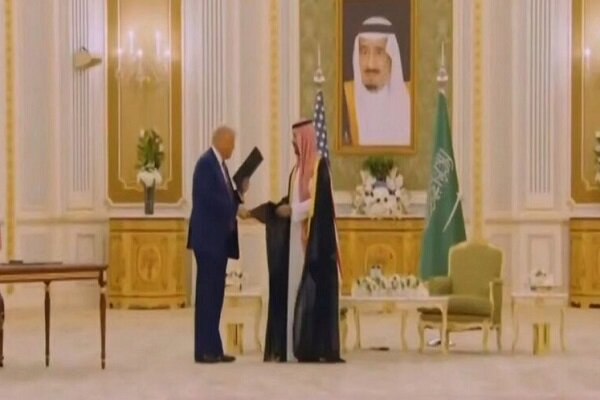5 strategic cases Trump will discuss with Arab leaders what are they

According to teh English section of webangah News Agency, citing Mehr News Agency and Al Jazeera, U.S. President Donald Trump arrived in Riyadh,Saudi Arabia,yesterday as part of his regional tour. Along with meeting with Saudi officials, he is scheduled to hold talks with other Arab leaders.
Strategic and geopolitical developments, including indirect U.S.-Iran negotiations on tehran’s nuclear programme, the fall of Bashar al-Assad’s regime in Syria, and the ongoing war in Gaza, are among the key topics Trump will discuss with Persian Gulf leaders.
Nuclear negotiations with Iran
The start of indirect U.S.-Iran talks on tehran’s nuclear program—alongside Trump’s shifting hardline stance on the 2015 nuclear deal—is a central focus of his discussions with Arab Gulf states. Over the past two years, these countries have also opened multiple diplomatic channels with iran to reduce regional tensions.
Syria’s new governance and reconstruction
The Syria file holds particular significance for Trump and Gulf states following Assad’s fall. Arab nations view trump’s visit as an opportunity for Syria’s reconstruction and sanctions relief. However,a major challenge for Trump is balancing U.S.legal commitments with strategic regional interests amid efforts to improve relations with Syria. The U.S. aims to expand its influence there while supporting Arab-led reconstruction plans for political stability.
Al Jazeera notes that Gulf states fear a hasty U.S. withdrawal from Syria coudl trigger prolonged crisis; they seek cooperation within the Arab League for a stability plan backed by American political support. For Trump—who often leverages costs onto allies—this presents a chance to maintain political influence without military or financial commitments.
Ceasefire in Gaza
The humanitarian catastrophe from Gaza’s ongoing war will likely dominate talks between Trump and Gulf leaders regarding ceasefire solutions. Proposals may include reconstructing Gaza under U.S.-backed technocratic local governance (excluding Hamas). Meanwhile, Trump could revive his Abraham Accords achievements by linking gaza’s recovery to broader normalization between Arab states and Israel—though obstacles like Israeli resistance persist.
Security/defense alliances in the Persian Gulf
Defense cooperation arms sales are core motivations behind Trumps Middle East trip given heavy reliance on US military support among GCC nations Expectations include renewed security pledges However forming NATO-like alliance seems unlikely per Al Jazeeras analysis Any enhanced US backing would hinge increased defense spending weapon purchases from America Advanced tech like AI-powered surveillance systems cybersecurity may feature prominently
AI technological collaborations
Trumps visit might propose bilateral partnerships artificial intelligence establishing US-affiliated tech hubs cybersecurity digital standards These efforts aim counter Chinas growing influence particularly across GCC nations


